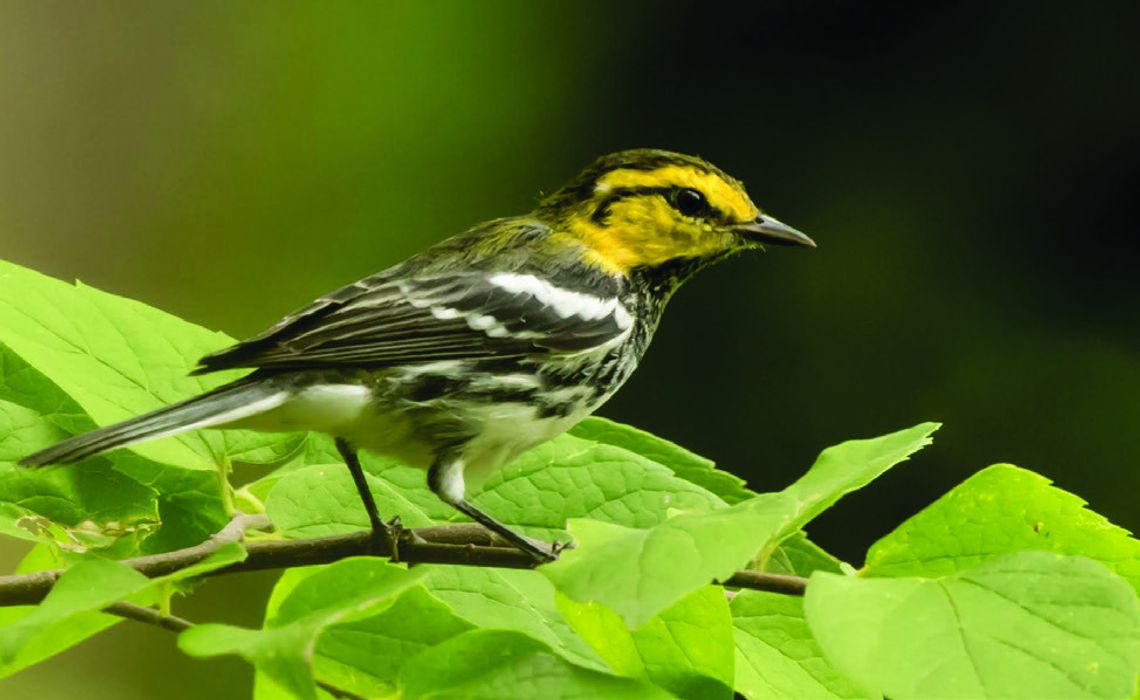Urbanization, drought, wildfire, continue to threaten songbird species
The golden-cheeked warbler, a migratory songbird that breeds exclusively in the oakjuniper forests of the Texas Hill Country, has been the subject of an ongoing battle between conservationists fighting to keep its protected status and those advocating for it to be delisted from the Endangered Species Act.
Two recent developments indicate that the bird may be headed to- ward a downgrading of its status from endangered to threatened.
On Jan. 17, the U.S. Fish and Wildlife Service (USFWS) announced that it had completed a 90-day review of the Texas Public Policy Foundation (TPPF)'s petition to delist the warbler and found that it presents substantial information indicating that a change in status may be warranted. Texas Land Commissioner Dawn Buckingham called the announcement a “major victory.”
'Texas property owners should be able to make decisions for their own land without the federal government impeding with an unjustified Endangered Species Act listing,' Buckingham said. 'The GLO looks forward to participating in this process and will ensure that ample evidence is presented to justify the much-needed decision to remove this prevalent Central Texas bird from the ESA list.'
The songbird, which can be recognized by the bright yellow markings on its cheeks and forehead, was federally listed in 1990 due to habitat loss and degradation. The birds winter in Central and South America and return to Texas in March to breed. Females use the bark from oldgrowth Ashe juniper trees to build their nests.
USFWS said the 90day finding does not trigger a change in the current endangered species status of the golden-cheeked warbler; rather, it initiates a more thorough review of all the biological information available for the species.
However, the USFWS announcement comes on the heels of its most recent fiveyear status review of the warbler, which was published on Jan. 7. The review is part of the agency’s customary review process for endangered species. It recommends that the species be downgraded from endangered to threatened.
“This comprehensive assessment of the species indicated that the golden-cheeked warbler is not currently in danger of extinction throughout all or a significant portion of its range, but is instead in danger of extinction in the foreseeable future throughout its range,” according to the press release.
The agency said the recommendation is due in part to ongoing research that better clarifies the understanding of the species and its habitat conditions, and in part to habitat conservation.
“While these efforts are encouraging, the review confirmed that the species and its habitat currently face ongoing threats from urbanization, drought, and wildfire, among other stressors, and will continue to do so into the future,” the agency said.
Azalia Rodriguez, Texas Representative for the Defenders of Wildlife, said their assessment of the USFWS 5-year status reviews indicates that the report is overly reliant on the 2023 Mueller study, which they believe is very inaccurate when it comes to estimating the goldencheeked warbler population.
“From our standpoint we don’t believe that downlisting and certainly not delisting is appropriate at this time,” Rodriguez said. “Even if the population has increased, that doesn’t determine whether a species is downlisted or delisted, especially with the repeating threats that are happening in the Hill Country.”
If the recommendation to downgrade the golden-cheeked warbler to threatened status is approved by the Secretary of the Interior, USFWS would publish a proposed downlisting rule in the Federal Register, which would provide an open period for public review and comment.
“Historically our organization has always commented on these issues, especially for this particular species,” Rodriguez said. “It’s definitely something we’ve kept a close eye on, and we’re always happy to comment when that period comes.”
Paul Fushille, Natural Resources Specialist, Sr. with the Balcones Canyonlands Preserve and Chair of the Parks & Recreation Commission for the City of Dripping Springs, has been involved in efforts to manage and protect golden-cheeked warblers since the 90s. He said that since the warbler’s ESA listing, research shows that we have lost or degraded well over 40% of the songbird’s suitable habitat, much of it in the rapidly growing Austin and San Antonio areas. He said it takes decades, if not centuries, for this species' habitat to recover.
“Personally, I find calling the species a ‘prevalent Central Texas bird’ quite disingenuous,” Fushille said. “I monitor these birds annually and work on the wellestablished Balcones Canyonlands Preserve, where we strive to protect this unique species and others. Yet, I frequently visit areas predicted to have occupied habitat - only to find none or far fewer birds than expected.”
Fushille said that while downlisting may be warranted, complete delisting would, in his opinion, doom the species.
More information on the USFWS actions can be found on their website, www. fws.gov.
.png)












